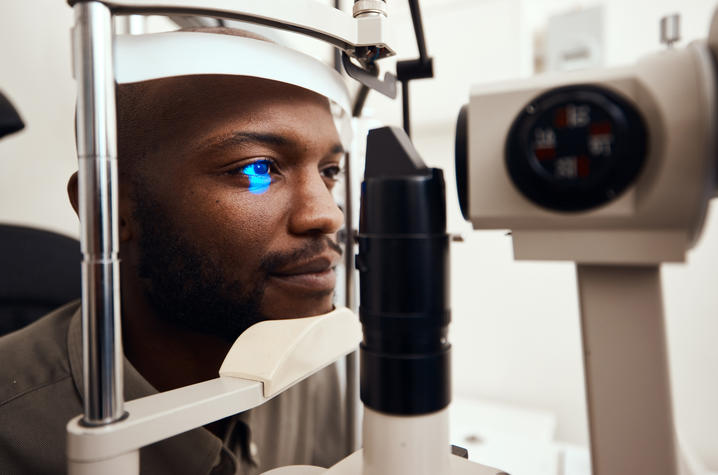How does stroke impact your vision?

The University of Kentucky Public Relations and Strategic Communications Office provides a weekly health column available for use and reprint by news media. This week's column is by Padmaja Sudhakar, M.D., of the Kentucky Neuroscience Institute and UK Advanced Eye Care.
LEXINGTON, Ky. (Aug. 1, 2022) — The visual pathway is very long and goes from the eyes to the occipital lobe, which is the region in the cerebral hemisphere that processes vision. Since the visual pathway goes through the cerebral hemisphere on each side, stroke affecting certain areas of the cerebral hemisphere will impact the visual pathway and produce visual field loss.
Patients will notice missing areas in peripheral vision. In a bilateral occipital lobe stroke, a patient may experience profound loss of vision in both eyes.
When the carotid artery in the neck or in the head is blocked from a clot, this clot may spread to the artery supplying the retina and can cause vision loss.
There are certain areas in the brain which operate as perceptual segments of the visual pathway. When this is affected through stroke there may be impaired visuospatial function, impaired visual attention or deficits in visual recognition.
When the brain stem is affected, a patient may experience double vision since it can affect cranial nerves that control eye movements. Eyes will be misaligned in such cases.
Stroke can sometimes cause darting movements of the eye called nystagmus. Some strokes can cause unequal pupils.
Are there warning signs of a stroke that affect your eyes?
A person should be concerned if they have the following symptoms:
- Transient loss of vision in one or both eyes.
- Sudden severe vision loss in one or both eyes.
- Missing areas in the peripheral field.
- Right or left sided loss of peripheral vision.
- Double vision.
- Symptoms of dizziness.
- Darting eye movements.
What should I do if I experience these symptoms?
If you experience the above symptoms, seek immediate attention. Do not wait for symptoms to resolve or improve on their own. You should get your eyes urgently checked with your local eye doctor. If you are unable to get an immediate eye exam, please get yourself evaluated in the nearest emergency room as soon as possible.
As the state’s flagship, land-grant institution, the University of Kentucky exists to advance the Commonwealth. We do that by preparing the next generation of leaders — placing students at the heart of everything we do — and transforming the lives of Kentuckians through education, research and creative work, service and health care. We pride ourselves on being a catalyst for breakthroughs and a force for healing, a place where ingenuity unfolds. It's all made possible by our people — visionaries, disruptors and pioneers — who make up 200 academic programs, a $476.5 million research and development enterprise and a world-class medical center, all on one campus.




